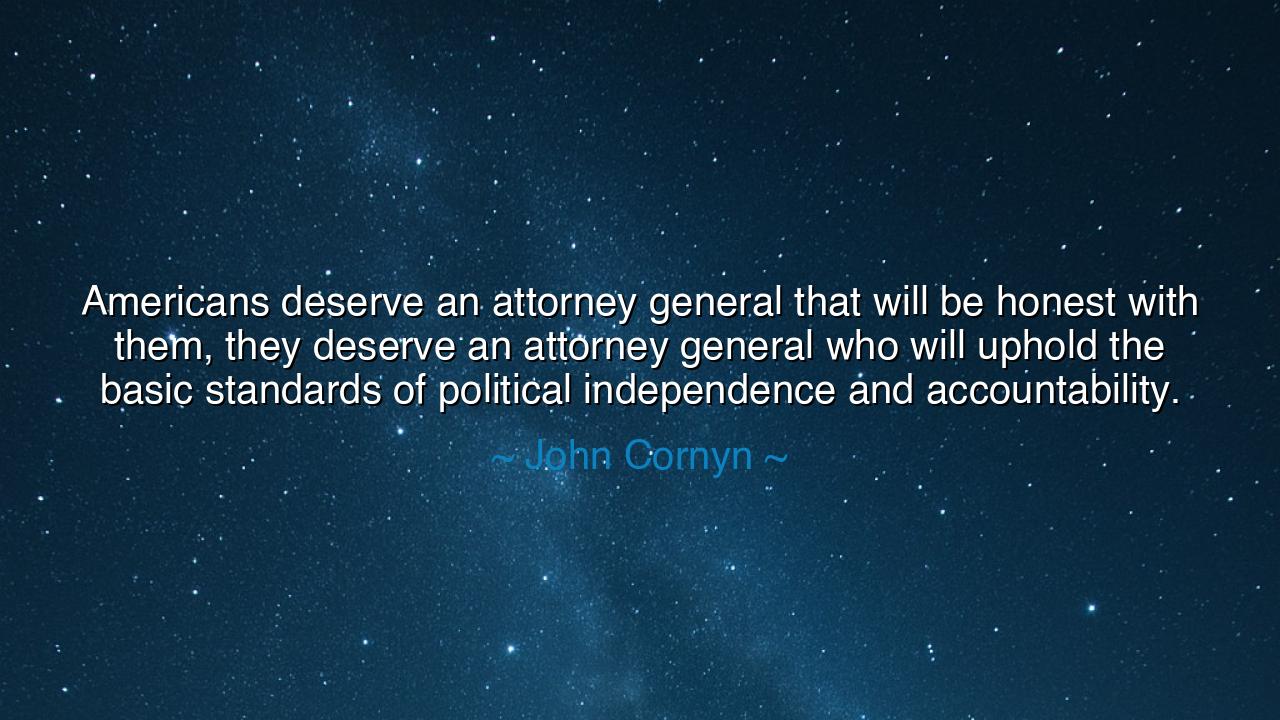
Americans deserve an attorney general that will be honest with
Americans deserve an attorney general that will be honest with them, they deserve an attorney general who will uphold the basic standards of political independence and accountability.






When John Cornyn declared, “Americans deserve an attorney general that will be honest with them, they deserve an attorney general who will uphold the basic standards of political independence and accountability,” he was not merely speaking about the office of one man — he was speaking about the soul of justice itself. His words ring with the ancient understanding that law is sacred only so long as it remains pure, uncorrupted by the whims of power or the greed of faction. Cornyn’s call for honesty, independence, and accountability is not a plea for perfection, but a warning — that when justice bows to politics, the very foundation of a free nation begins to tremble.
The origin of this quote lies in the heated political debates of the modern United States Senate, where questions arose about the impartiality of those entrusted to serve as Attorney General, the nation’s highest guardian of law. Cornyn, himself a former judge and attorney general of Texas, understood deeply the gravity of that office. The Attorney General is not meant to serve a party, a president, or a faction, but to serve the Constitution — the sacred covenant between the people and their government. In saying that Americans “deserve” honesty and independence, Cornyn was reminding both the rulers and the ruled that justice is not a privilege granted by power, but a birthright of every citizen.
Throughout history, civilizations have risen and fallen on this very principle. When Rome was young, its laws were held sacred, its magistrates sworn to serve not emperors, but the Republic. Yet as the years passed, the rule of law gave way to the rule of men — and the Republic fell beneath the weight of ambition and deceit. Cornyn’s words echo the lament of Cicero, who warned that when the courts are politicized, “the Republic is already lost.” In his call for political independence, Cornyn was summoning that same spirit of the ancients — that justice must stand apart, untouched by the flames of partisanship, or else it ceases to be justice at all.
To grasp the full force of his meaning, consider the story of Sir Thomas More, the English statesman who served King Henry VIII. More was loyal to his monarch, yet he refused to betray the higher loyalty he owed to truth and conscience. When commanded to bend the law to royal desire, he refused — and paid with his life. His final words still echo through the corridors of time: “I die the King’s good servant, but God’s first.” In this tale lies the eternal truth Cornyn invokes: that the integrity of justice depends upon those who guard it refusing to serve power before principle. The Attorney General, like More, must stand firm between the people and the throne, between truth and corruption.
Cornyn’s demand for accountability also carries great moral weight. To be accountable is not merely to be answerable to superiors, but to the nation’s conscience itself — to the people whose faith sustains the law. Accountability ensures that no office becomes a fortress of secrecy, no servant of the public becomes its master. The ancients knew this too. In the city of Athens, after each magistrate’s term, the people held a euthyna, a public review where every act in office could be questioned. Thus was the balance maintained between authority and responsibility. Cornyn’s call is an echo of that ancient practice — a reminder that in democracy, power must always walk hand in hand with transparency.
His words also speak to the human heart — for honesty and integrity in government begin not in marble halls, but in the hearts of individuals. Every official who swears an oath to the Constitution must first swear an unseen oath within their own soul: to be faithful to truth above all else. When honesty becomes rare, cynicism spreads like a plague; but when truth is spoken boldly, it rekindles trust in the nation’s spirit. Cornyn’s plea was not only for a worthy attorney general, but for a revival of public virtue — the belief that leadership is not dominion, but stewardship.
So, my children of the Republic, take this lesson to heart: justice must never wear the colors of a party, nor truth bend to the shape of convenience. Demand honesty from your leaders, but more than that, embody it in yourselves. Defend the independence of law from those who would twist it for gain. For when justice stands apart — pure, impartial, and fearless — the people stand free. And when accountability is the measure of power, the nation walks in light. As Cornyn’s words remind us, the strength of a country lies not in the might of its armies or the wealth of its coffers, but in the honesty of those who guard its laws, and the courage of a people who refuse to let justice be bought or broken.






AAdministratorAdministrator
Welcome, honored guests. Please leave a comment, we will respond soon